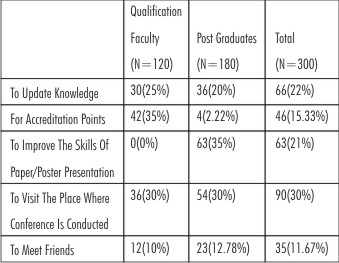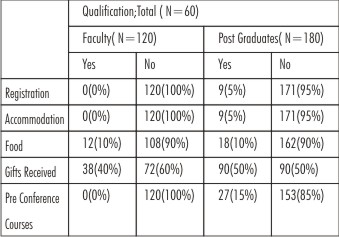Introduction
India is second most populous country in the world having wide variety of branches in the field of health care such as medicine, dentistry, ayurvedic, homeopathy, unani, nursing etc. As the health care field has been expanding, a wide range of specializations have emerged in each of these branches. These specialties use conferences as platforms for sharing knowledge, exploring recent innovations, and work with peers as well as getting their feed back to enlighten their research path[1]. Interactive scientific sessions, symposiums, workshops, poster and paper presentations are the core events in these speciality conferences.
Although participating in scientific conferences is almost essential to career development, it need not to be a large or expensive project[2]. An estimation of more than 1,00,000 conferences are being conducted in field of health care every year around the globe[1]. Unlike past various other programs such as conventions, CDE programs, workshops are also being conducted along with national and state level conferences on regular basis in their respective specialties which might become an overload to the delegate in attending them. Also, the main intention of attending such conferences is gradually changing in recent past years. The submission of plethora of scientific research abstracts with no or superficial peer reviews is leading to moderate curriculum vita building[1].
Though specialty conferences are providing immense knowledge on recent advances and innovations there is virtually no evidence supporting the utility of these conferences[1]. Hence this study was conducted with an aim todetermine whether speciality conferences are becoming a boon or burden to the delegates attending them. The objectives of the study are to determine the perceptions of faculty members and post graduate students on speciality conferences and to add a note on the reforms that can be brought about in speciality conferences.
Materials And Methods
Study Design
This is a cross sectional questionnaire based study and sample of convenience was used. The study was conducted in the month of August to November 2014.
Study Partcipants
The study queried faculty members and post graduate students (2nd and 3rd year) enrolled under Indian Association of Public Health Dentistry (IAPHD).
Study Instrument
A self designed pre-tested questionnaire with 12 questions was used in the study which consists of both open ended and closed ended questions. The questionnaire is divided in to three domains based on knowledge gained, scientific sessions and other aspects related to conference.
Pilot Study
Pilot study was done on a sample of 30 members for evaluating the validity and reliability of the questionnaire in English language and these members were not included in the final study. Expert content validation and test-retest reliability of the questionnaire is done.
Ethical Clearence
Ethical clearance is obtained from institutional ethics committee of Mamata Dental College, Khammam.
Study Procedure
On a prefixed date, the questionnaire was mailed to all the faculty and 2nd and 3rd year post graduates enrolled under IAPHD and by determining the purpose of the study.
Information on the opinion on specialty conferences along with demographic data is collected. The members were asked about their views on various aspects of the speciality conferences.
Statistical Analysis
The data was collected and descriptive statistics was done to calculate the frequencies and percentages in SPSS version18.
Results
The questionnaire is mailed to all the subjects. A total of 300 members (N=300) participated in the study (response rate =30%). Among them 180 were post graduates and 120 are faculty. Their age ranged from 24-60 years. The study findings revealed that, only 45% of the post graduates are gaining extra knowledge through speciality conference. 60% of the total sample agreed that the pre-conference courses are not justifying. 50% of the faculty and only 40% of the post graduates felt that guest lectures by foreign speakers from abroad are not practically applicable to Indian scenario. (Table 1).
 | Table 1 - Opinins Of Participants Regarding Knowledge Gained.
 |
A total of 70% of the faculty stated that the quality of scientific sessions is declining in recent years and 80% of the post graduates reported that the time allotted for scientific sessions is not sufficient. Both 95% of the post graduates and 90% of the faculty opted that the criteria for selecting the best paper/poster should be known to all the participants. (Table 2).
 | Table 2 - Opinions Of Participants Regarding Scientific Sessions
 |
Only 15% of the post graduates stated that luxurious accommodations and gala banquets are necessary in speciality conferences and majority of the subjects have an opinion that disclosure of feedback form is necessary from all the delegates at the end of the conference. (Table 3).
 | Table 3 - Opinion Of The Partcipants Regarding Confounding Aspects
 |
When asked for their opinion regarding the reasons for attending the speciality conference, majority of the faculty opted for accreditation points and the post graduates for improving their paper/poster presentation skills. Among the total subjects most of them reported for visiting the place where conference is conducted. (Table 4).
 | Table 4 - Reasosn For Attending Speciality Conference
 |
Majority of the study participants expressed their view that the speciality conferences are not beneficial in terms of registration fee, accommodation, gifts received, food and guest lectures. (Table 5).
 | Table 5 - Opinion Of The Partcipants On The Cost-effective Ness Of Various Aspects Of Conference.
 |
Discussion
Conference organized under various specialities and related organizations are a dominant feature of the academic, professional and social life of all health- related disciplines.Although these are worthy goals, there is virtually no evidence supporting the utility of most of the conferences.
This is the first study of its kind conducted with regard to Indian scenario. In the present study, majority of the faculty members and 100% of the post graduate students stated that conferences are not beneficial from economic point of view. This might be due to high registration fee which is becoming a burden to the delegates which is in accordance with Jhon P.A et al (2012) on medical conference[1].
Even though the numbers of delegates attending the conferences are increasing year by year, 70% of the faculty and 60% of the post graduates stated that the quality of scientific sessions is declining and 80% of the post graduates are not satisfied with the time allotted for paper presentations. This may be due to bulk acceptance of research papers without proper reviewing which leads to prolonged scientific sessions and allotment of short time period for each participant.
Majority of the study subjects are attending the conference to visit the place where conference is conducted, which indicates that the delegates attending the scientific sessions are less and dissemination of knowledge is restricted.
Most of the participants stated that guest lectures by foreign speakers (abroad) are not applicable to Indian scenario. The probable reasons are comprehensive ability of language, conditions in the Indian environment and the policies of government that may not be supportive.
Conclusion
In the present scientific era, quality and innovations in the ongoing research is possible only with such large professional meetings. However there is equipoise about the utility or lack of these conferences. It may be time to perform formal studies to assess the reforms necessary in conducting these speciality conferences. Keeping in view the results obtained in the present study, these reforms can be mainly focused on cost effectiveness of registration fee, quality of scientific sessions, paper presentations in post graduate conventions, utility of pre conference courses, etc.
Refercences
1. John P A. Loannids. Are medical conferences useful? And for whom? JAMA,2012:307(12):1257
2. Wiiliam A M Cutting, Participate in an international conference, BMJ, 1995 January: VOL 310:249-251.
3. Green M. Are international medical conferences an outdated luxury the planet can’t afford? Yes. BMJ,2008:336(7659):1466
|